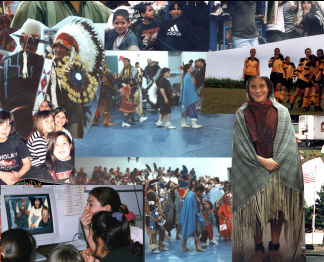Interactive Partnering
The Cradleboard Teaching Project is dedicated to providing all students and teachers with accurate, enriching Native American Core Curriculum and supplementary materials. Subscribers to our Electronic Powwow are not partnered, but can interact informally with other classes via chat rooms and discussion boards. Experienced Cradleboard classes can apply for our Partnering Program, which involves a commitment to your partner class far away. Whenever possible we bring the Native American studies experience to life, reinforcing the curriculum with opportunities to build live and interactive cross-cultural friendships. For Cradleboard teachers who have spent at least one year in the Electric Powwow model using the general discussion boards and chat rooms and do want to be part of an interactive partnership with a peer class far away, we offer Cradleboard Partnering. Since 1997, Native American classes in Mohawk, Cree, Ojibwe, Quinault, Menominee, Chippewa, Coeur d’Alene, Navajo, Apache, Siberian Yupik, and Hawaiian communities have interacted with same grade classes in the states of Minnesota, Michigan, New Mexico, Arizona, Montana, Washington, Pennsylvania, New York, New Jersey, Wisconsin, Hawaii, Idaho, and Washington, D.C.. |
   |
For these veteran
Cradleboard Partners, we build a custom website exclusive for the use
of the two partnering classes. The partnering teachers receive an online
binder of materials which include guidelines, calendar, suggested schedules
of interactivity, new curriculum, and other information to help the teachers
to get to know one another, and to plan and enfold Cradleboard activities
into their existing school calendars. Although we suggest schedules of
interactivity, it’s totally up to the two teachers what they do
and when they do it. Partnering Cradleboard classes also receive everything
that’s offered in the Electronic Powwow, and of course all
the curriculum, supplements and other resources found at the public area
of our website. Cradleboard Partners are kept apprised of Cradleboard
Presentations, Cradleboard Conferences, and Cradleboard 101 Teacher Training
Workshops throughout the year. |
 |
To
help the two classes and teachers to get acquainted, we have designed
preparation activities. Partnering students make self-identity videos,
and exchange culture-based lists of questions and answers, and local
materials. The idea is to help students to self identify, and also to
appreciate their partner’s cultures. Before the partners ever
meet, they prepare lists of 20 questions about their partner and 20
statements about what they would like others to know about themselves.
Individual students create a personal resume and post it with a small
photo of themselves in the discussion area so that others reading the
message can see the person who posted it. |
| After completing preparation activities, the partners finally “meet” via Cradleboard’s private custom conferencing environment. They engage in email exchanges, discussions, chat rooms, and sometimes video conferencing and get to know one another over self-designated periods of interaction. Partnering classes are also encouraged to go online via the Cradleboard Teaching Project website and to do projects together which involve internet research. Some classes create Study Buddy relationships and pool their findings. Several of our Cradleboard classes have even gone to visit one another over a period of days at their respective schools. In some cases, the Native American partner community creates tribal specific curriculum materials for the use of their partner class and other Cradleboard classes. If you have already enjoyed at least one year in our Electronic Powwow model of the Cradleboard Teaching Project, and wish commit to an interactive study partnership with another dedicated Cradleboard class within your own exclusive area of the website, please send us a message at info@cradleboard.org and put Cradleboard Partnering in the subject line of your message. |
Study Buddies Teachers can elect to create Study Buddies: one student from your school, the other student from your partner school. Draw names to determine who will be your Study Buddy. Partnering classes are also encouraged to go online via the Cradleboard Teaching Project website and to do projects together which involve internet research. These activities can be used as class-to-class team activities, with teachers dividing the work appropriately between the two classes. Some of the topics teachers suggest:
Preparation Activities: 20 Questions/20 Statements The Cradleboard Teaching Project exists because educators want more enriching, accurate Native American material in all schools. We encourage non-Indian students and teachers not to be shy, but to ask anything they really want to know about Native American people and culture. That’s how we can overcome ignorance together. Students ask things like: Do you live in tipis? Have you ever seen a real Indian tipi? Can you vote? Are you angry at the United States? Do you smoke pot in those peace pipes? What things are important to you? What kind of music do you like? Do you think of yourselves as your tribe or Indians or Americans? Here are some of the questions that the students in Ms. Robert’s grade three class at Salmon River Central in New York sent to Tahola Tribal School in the state of Washington before they had met. Questions for Tahola Tribal School from Salmon River 3rd Grade
Here are some of the statements that Ms. Guge’s class at Tahola Tribal School in Washington state sent to their partner at Salmon River Central in New York before they had met. What we’d like others to know about us
Here are some more questions that various non-Indian classes asked their Native American partner.
|
| Main Menu | Curriculum & Supplements | Cradleboard Private Area | Store |
©2002 Nihewan Foundation
